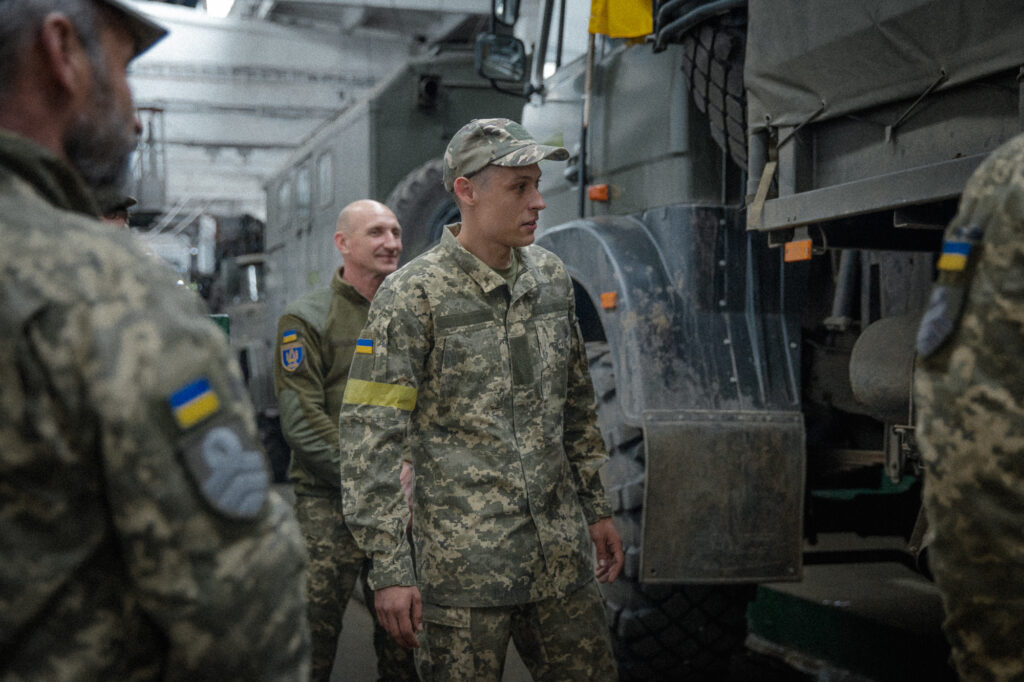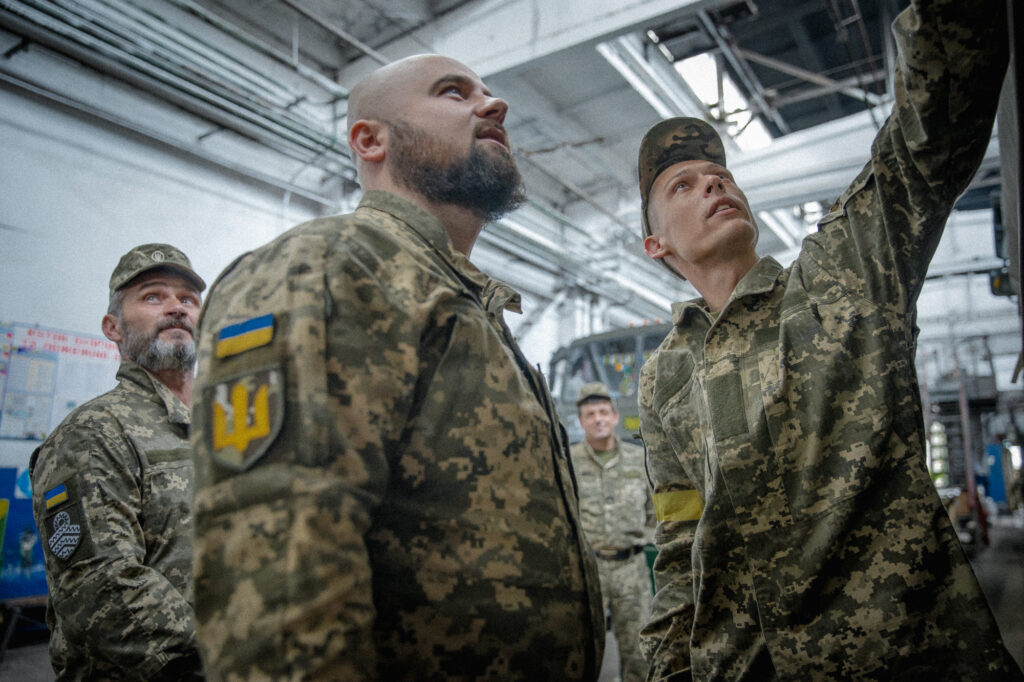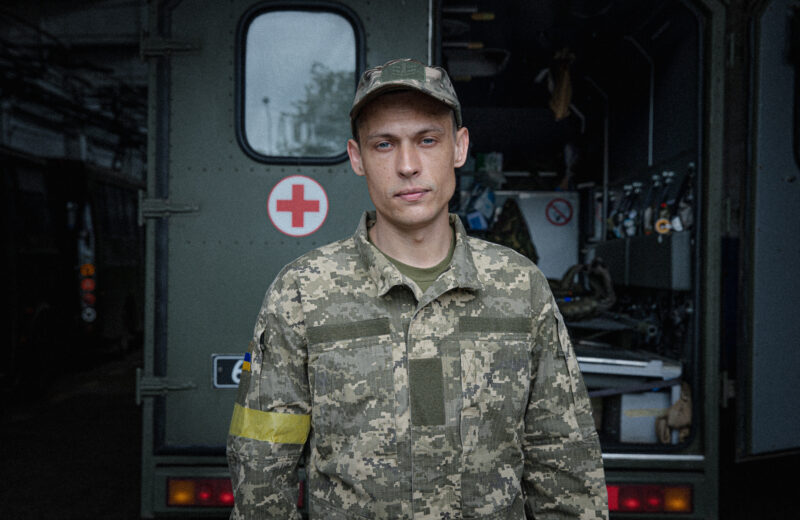Their daily routine is simple: getting broken down or shot-up trucks and fighting vehicles back onto the road.
Even though their garage is still vulnerable to Russian missile attacks, the mechanics are quite far away from the shooting.
But Ninchenko. is from Mariupol, and he has not heard from his wife, son or daughter since mid-March. All he knows about their home is that Russian shells have shredded the exterior, torn up the yard and smashed all the windows. He has no idea about the water and gas lines.
His neighbors, still located behind enemy lines, tell him the house is still standing, but his family is no longer there.
“I think about them all the time,” the 28-year-old professional soldier told Kyiv Post in an interview. “But there’s not much else I can do.” A native of Vinnytsya in central Ukraine, Ninchenko has five years worth of service with the Ukrainian Armed Forces under his belt.
He met his wife, who is originally from an Azov Sea resort village and also serves in the military, while both were attending a military school.
Their son had just started kindergarten before the war began. Using savings, loans and a lot of do-it-yourself effort, the Ninchenkos had been building a house in Mariupol’s Kalmiusky District, a residential area on the city’s northern edge. It was almost finished when the Russians arrived.
The worst damage to the house came early in the fighting, he said, because when Russian Federation (RF) troops surrounded Mariupol, the Nichenko home wound up only a few hundred meters behind Ukrainian army positions.
The fighting eventually moved on, but for the better part of two months Russian bullets, shells and rockets pounded Kalmiusky District. Power to the Nichenko home – and communications between Ninchenko and his wife and kids – failed in the first week of the war.
Ninchenko now lives in an industrial building with rooms converted into sleeping quarters. He shares his room with several other non-commissioned officers (NCOs). He gets up early, washes and has breakfast – the day Kyiv Post visited, which was oatmeal and tea.
Then it’s off to work – across a Soviet-era asphalt parking lot filled with infantry fighting vehicles, armored cars, trucks, buses, 18-wheel rigs, pick-up trucks, trailers and cannon. All are broken somehow, and more than a few are stenciled in white with the letters “Z” or “V” used by Russian troops. His workplace is in a half-completed brick building.

Junior Sergeant Dmitro Ninchenko briefs drivers and mechanics on the day’s work tasks (MAKS PILIPENKO)
The first and usually only more or less formal meeting of the day is with maintenance officers from the 50th Mechanized Infantry Brigade. There is a blackboard listing the status of vehicles, assigned drivers and mechanics, and notes about missing parts.
Posters on the wall warn drivers to be careful and everyone to be safe. Ninchenko usually heads up the repair of four to six wheeled vehicles, generally trucks. On average, one or two trucks come in, and one or two leave, every single day. There are no days off.
The only way to get decent gloves for work is to buy them yourself. There are no hydraulic jacks, few power tools, and tire bolts are loosened and tightened the old-fashioned way: with a lug wrench and back strength.
Maintenance in the Ukrainian Armed Forces is led by the driver, who does simple jobs like oil changes and brake pad exchanges, under the supervision of one of Ninchenko’s mechanics.
If it’s something more complicated, like replacing gaskets or taking apart an engine, one of Ninchenko’s jobs is to decide how competent the driver is to do that and how much outside help he really needs.
The maintenance shop has tools of its own, but, Ninchenko says, practically all the drivers have tool kits of their own. The Ukrainian Armed Forces are too poor to issue truck drivers tools, so if they want a set, the options are buying tools oneself, hoping some volunteer group will donate the right tool, or putting the five-finger discount on abandoned Russian army vehicles containing a tool kit, he said.
Sometimes the UAF’s trucks come horrifically damaged. A big artillery shell can, in the worst case, blow an engine off its mountings, bend a drive shaft or, Ninchenko recalls, obliterate a driver’s cabin so completely that mechanics can’t even find a trace of the seats.
 Junior Sergeant Dmitro Ninchenko points out a vehicle detail to fellow servicemen in a maintenance
Junior Sergeant Dmitro Ninchenko points out a vehicle detail to fellow servicemen in a maintenance
shop operated by 50th Mechanized Infantry Brigade (MAKS PILIPENKO)
In most armies, never mind in peacetime civilian life, he said, vehicles in such condition would be written off and left to the insurance company.
The Ukrainian Armed Forces can’t afford that luxury, so about half the trucks in the 50th Brigade are either slowly being cannibalized into hulks or non-movers waiting for another, worse-off vehicle to donate a critical part.
Trucks in this war, Ninchenko said, are an expendable item that will soon be damaged beyond utility, long before the end of their official service life. The day-to-day job of a UAF mechanic isn’t long-term maintenance, it’s doing what’s possible to keep a vehicle running a little longer before it is destroyed.
Ninchenko told Kyiv Post the UAF pays him on time, that there are bonuses for working in a front-line sector, and that between doing nothing but maintaining and sleeping, and having no way to contact his family or send them money, he has managed to save some cash.
After the war he wants to move back to Mariupol. Ninchenko believes the UAF will recapture the city. When they do, he will finish building his house. He said he hopes he will find his family, but he doesn’t know when that will be.
NOTE: Kyiv Post journalists were accompanied by a UAF press liaison officer while researching this story. The brigade command requested its unit designation and soldier identities not be made public for security reasons. The 50th Brigade is a pseudonym as are soldier names. The actual identities are known to Kyiv Post.
Sour:kyivpost.com/ukraine
